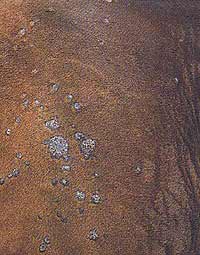
How to Treat Ringworm with Equine Homeopathic Remedies
 Ringworm is an equine skin disease or fungal dermatitis recognised by
circular areas of hair loss with crusting of the horse's skin which can
benefit with treatment by Homeopathy
Ringworm is an equine skin disease or fungal dermatitis recognised by
circular areas of hair loss with crusting of the horse's skin which can
benefit with treatment by Homeopathy
Ringworm is not a worm but is a very contagious fungal infection of a horse or pony's skin caused by different types of fungi - either the Microsporum or Trichophyton species.
A horse or pony with ringworm can pass the infection on to humans and naturally to other horses and ponies that it comes into contact with.
HOW IS RINGWORM SPREAD AMONGST HORSES?
Ringworm is spread by contact between infected horses or, more commonly, by sharing contaminated tack, grooming kit brushes or unwashed stable or turnout rugs.
It can also be passed on by grooms or visitors stroking an infected horse then stroking an uninfected horse.
Infection is very slow to appear and it may take several weeks before the signs of ringworm are visible on a horse.
It is not uncommon for a horse that has come from a dealer's yard to have ringworm appear.
HOMEOPATHIC REMEDIES FOR TREATING RINGWORM IN HORSES
There are several homeopathy remedies worth trying, which have been reported to cleared up or cured a horse with ringworm:
Homeopathic Bacillinum
This is a general remedy for treating ringworm in horses which is useful
for clearing up the rough, dry skin which accompanies ringworm. A dose
of 200c once a week is recommended
Sepia
Sepia is a homeopathic remedy suited to treat mares with ringworm
- especially if the outbreak is related to the oestrous cycle. A dose
of 30c of Sepia is usually prescribed.
Tellurium
Tellurium is the remedy to choose where the horse or pony's head is affected,
and benefits a horse that is sensitive to touch in the areas infected
by ringworm. Dose with 30c
Berberis and Chrysarobinum are other homeopathic medicines also used to treat ringworm
The effectiveness of any remedy may vary depending on what the cause or type of ringworm is affecting the horse.
GENERAL ADVICE ON HOW TO MANAGE AND TREAT A HORSE WITH RINGWORM
A horse or pony infected with ringworm should be isolated from other horses whilst being treated.
Any brushes used to groom the horse or pony should be thoroughly disinfected after each use.
Clipping long hair around the infected area and scrubbing with a mild soap and water can assist treatment of ringworm.
Once the horse is free of any symptoms or signs of ringworm, disinfect any equipment and tools used during treatment.
Remember that ringworm can be passed to humans - so take care to protect
yourself while caring for your horse.
HORSE CARE ARTICLES AND EQUINE ADVICE
Haylage For Horses | Benefits of Hay Steamers | Glucosamine for horses | Buying Secondhand Saddles | Pony Pad Saddle | Selenium | Horse B vitamin Supplements | Biotin | Pelham Bit | Horse Probiotics | Grakle Noseband | Hackamore | Arthritis Supplements for Horses | Treatment of White Line Disease | Sweet Iron Bit | Loose Stools | Looking After a Veteran Horses | Feed BalancersFor Horses | Giving Horse Electrolytes | Gelding Sheath Cleaning | Hydrotherapy for horse | Horse Eye problems | Worming program for Horse | Best Companion for horses | Horse Bit Fitting | Bot Eggs | Hoof care for horse | Laminitis | Mullen Mouth Snaffle |
